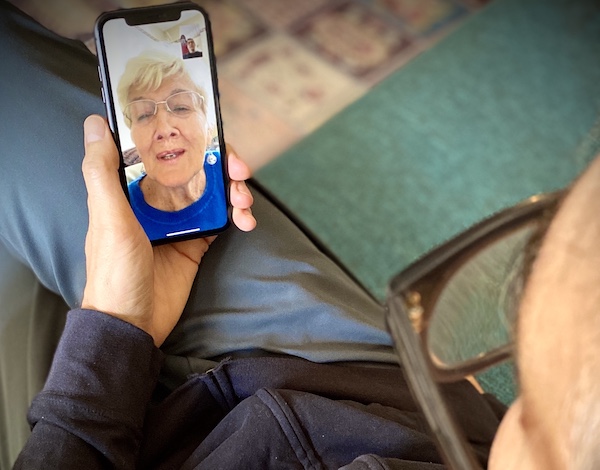Availability, Style & Denial
“M-O-U-T-H”
“Thank you John, but you don’t have to spell the word, just say the word you’ve heard.”
The very patient audiologist, my father and I were sitting together in a cramped, sound-proof room. I admit I had to chuckle at my dad spelling out the words instead of just repeating them. He always had been a good speller, but in this case spelling back the words was a reflection of his dementia.
He was also a surprisingly stubborn man which he applied to resisting hearing aids despite the fact that he knew he couldn’t hear clearly.
We were lucky he eventually consented.
His wife thanked me.
Hearing Loss Increases Dementia Risk
One surprising aspect of hearing loss is the connection to dementia. In a study that tracked 639 adults for nearly 12 years, Johns Hopkins expert Frank Lin, M.D., Ph.D., found that mild hearing loss doubled dementia risk. Moderate loss tripled risk and people with a severe hearing impairment were five times more likely to develop dementia.
Not only can hearing loss dramatically increase the risk of dementia, but if an older adult cannot understand those around them they may avoid conversations and social gatherings. This dynamic can then lead to social isolation which could then lead to depression and further withdrawal from activities. All that can add up to a pretty good argument for using hearing aids.
NEW! Hearing Aids Available
Over-the-Counter (OTC)
Starting mid-October 2022, the U.S. Food and Drug Administration is allowing some hearing aids to be purchased over the counter. The cost and required prescription for hearing aids has been an obstacle in the past. The FDA change establishes a new category of over-the-counter (OTC) hearing aids, enabling consumers with perceived mild to moderate hearing impairment to purchase hearing aids directly from stores or online retailers without the need for a medical exam, prescription or a fitting adjustment by an audiologist.
With OTC hearing aids available, there are essentially three different kinds of hearing enhancement product categories.
- Personal Sound Amplification Products (PSAPs)
- Intended for people with normal hearing to amplify sounds in certain situations, such as recreational activities like birdwatching or hunting.
- Over the Counter (OTC) Hearing Aids
- For mild to moderate hearing loss
- Sold in retail stores and online
- No prescription needed
- Standard prescription hearing aids
- For all levels of hearing loss, including severe
- Prescription is needed
OTC Purchases Can Be Online or Retail
You can purchase OTC hearing aids from either a brick and mortar retail store or through an online retailer. There are pros and cons to both.
When purchasing OTC hearing aids from a retail store, you can immediately have the product, but you won’t be able to customize the fit and the quality may not meet your expectations. You are also on your own in determining the level of hearing loss and selecting the kind of aid. When shopping, you’ll want to keep the following features in mind:
- battery life
- warranty
- size and weight
- volume control
When purchasing an OTC hearing aid from an online retailer you will have to wait for it to be shipped, but you have the benefit of the fact that online hearing aids are registered with the FDA. Even though they don’t require a visit to the doctor or a prescription to purchase online hearing aids, these aids are dispensed through audiologists. When purchasing online hearing aids, you’ll receive services like:
- an online hearing test
- personalized programming based on test results
- telehealth support with an audiology team
- remote adjustments
- financing options
For OTC hearing aids sold by online retailers, we found four highly recommended brands: Lively, MDHearing, Eargo (which offers a 20% discount for Veterans on a specific model) and Lexie. They are different price points and have different features, but they all come with at least a 45-day risk-free trial (which on a side note is way more generous than what I got with my 70lb rescue dog).
Hearing Aid Style Options
There are a range of options when it comes to hearing aid designs as they are no longer the bulky, highly visible kind that your grandpa had. The graphic below from the FDA shows the various styles.

How to Approach the “Hearing Aid Conversation” with an Older Adult
Among adults aged 70 and older with hearing loss who could benefit from hearing aids, 30 percent have never used them. If you have an older adult in your life who really needs hearing aids, but is resistant here are four tips for how to approach the topic:
- Encourage dialogue. Let them know what you’ve observed about them not hearing or understanding conversations. Maybe point this out: Michelle Matyko, Au.D., an audiologist in New York says “You can explain that hearing aids are just like glasses, and if someone can’t see well, wouldn’t you suggest they try glasses to help them?” If they are concerned about how hearing aid will look it may help to point out that hearing loss is more obvious than a hearing aid.
- Provide literature on hearing loss or give them this quiz to determine if seeing an audiologist would be helpful. You could mention the fact that nearly 30 million U.S. adults could benefit from using hearing aids.
- Encourage them to talk to their doctor. Sometimes a recommendation from a medical provider makes the need legitimate.
- Be patient. This may be something that they need to decide to do (or not) and on their own timetable. It’s very possible that the best thing you can do is respect their decision.







